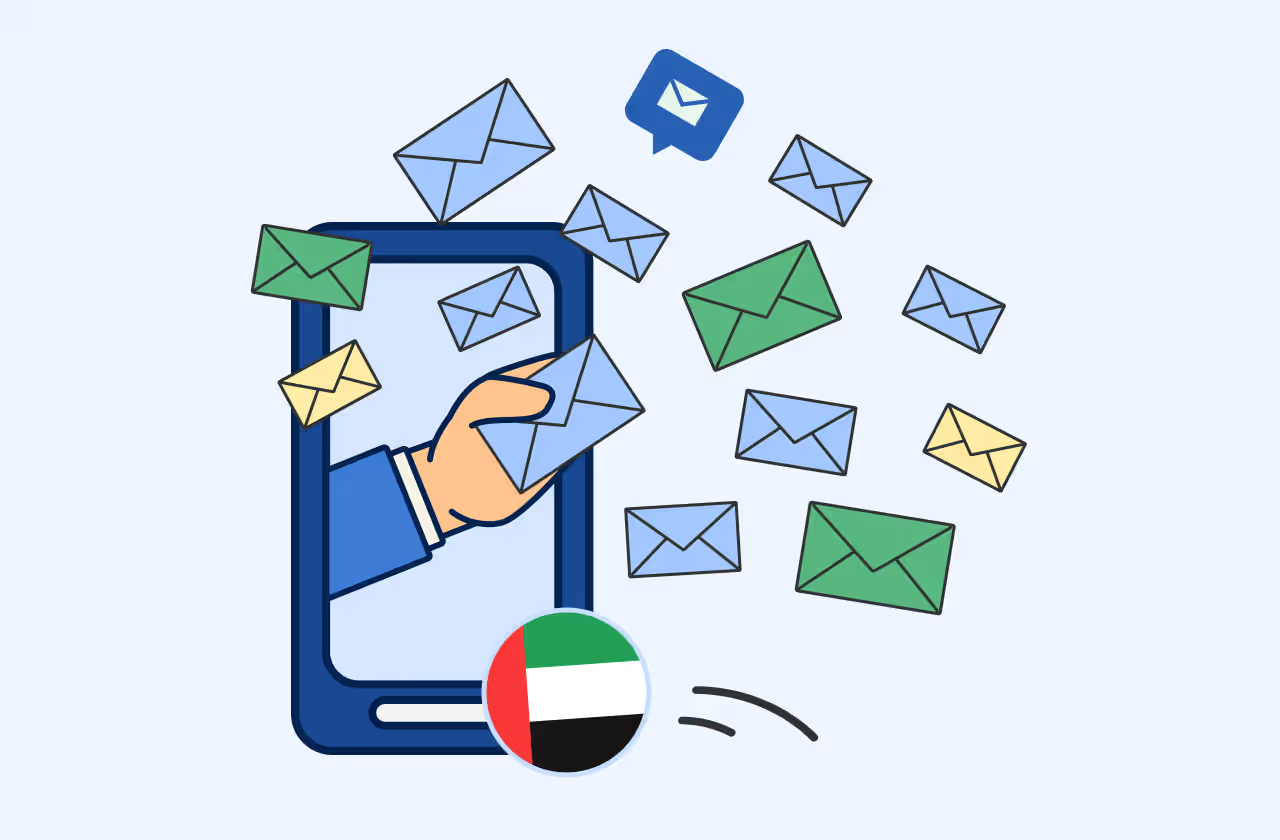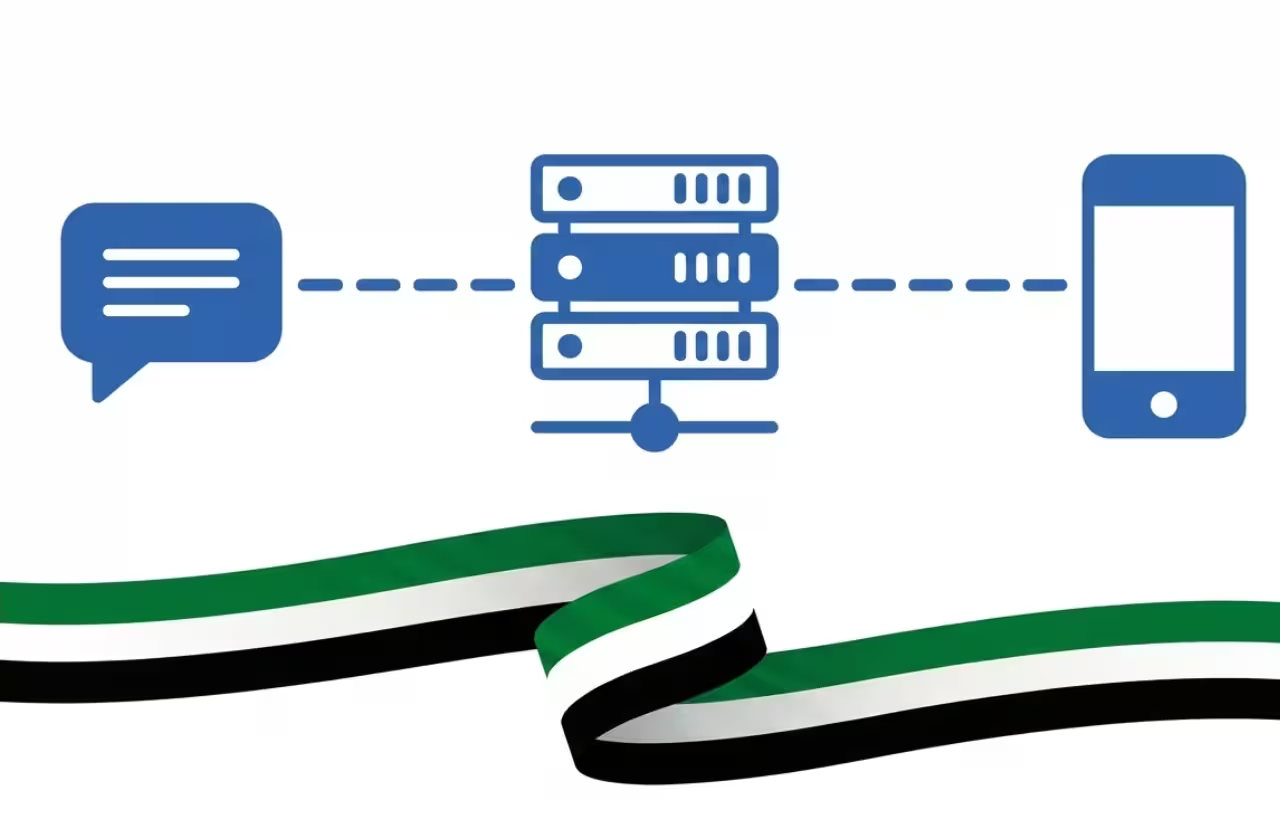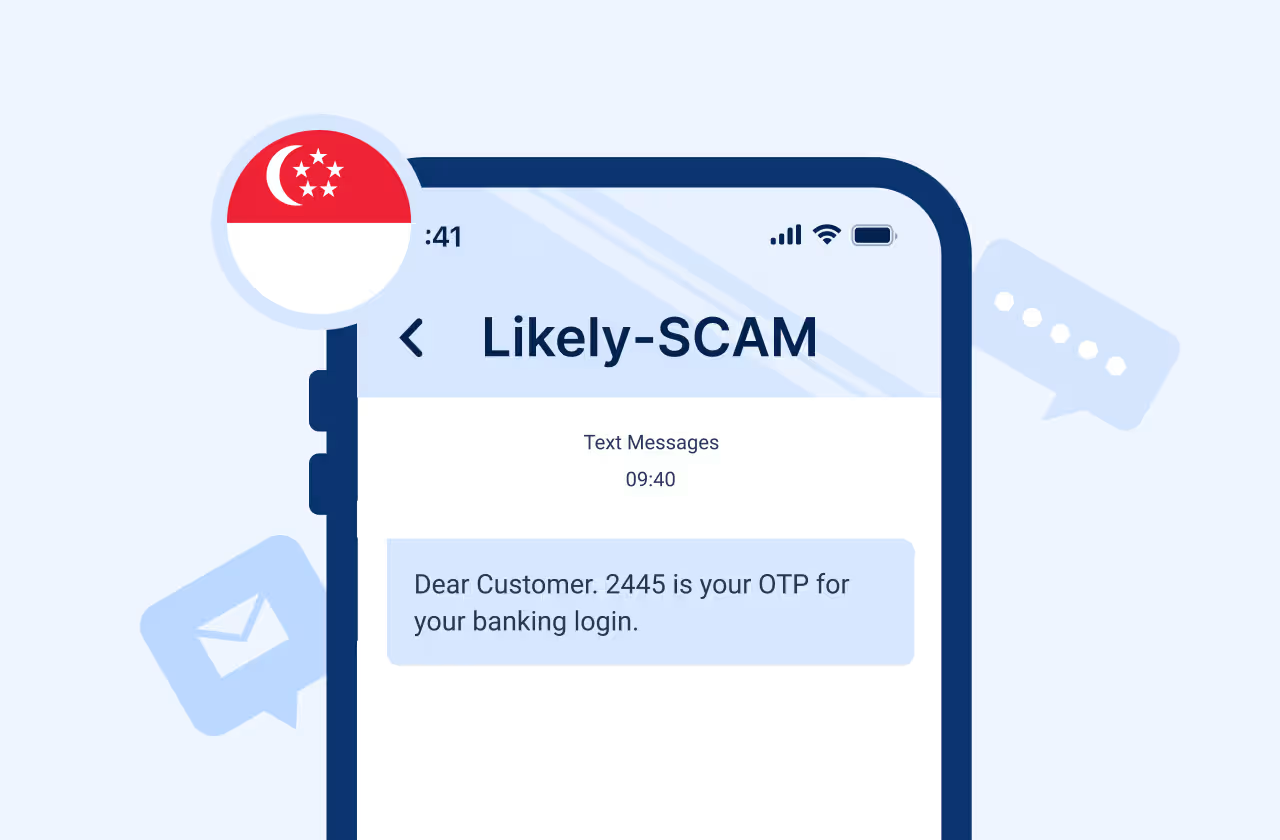Key Takeways
- Sent as SMS via server is associated with the protocol around RCS and the feature of SMS fallback
- In situations where the RCS connection cannot be established, the message is sent via server and it acts as an intermediary
- RCS connection issues and ensuring reliable message delivery are some of the reasons for "sent as SMS via server"
- Sent as SMS via server can easily be disabled from the settings of a mobile phone
- While you can disable SMS fallback for RCS is, but it is also crucial to consider recipient compatibility, connectivity stability, and the loss of advanced features before doing so
What Does "Sent as SMS via Server" Mean?
To send SMS, you need an SMS API provider and to enable use cases like SMS verification, you'd need an SMS verification service.
The message "Sent as SMS via server" is closely associated with the RCS (Rich Communication Services) protocol and its SMS fallback feature.
When you send a text message using RCS, the protocol relies on establishing a reliable RCS connection between both parties involved.
This connection enables a seamless and enriched messaging experience with features such as reading receipts, typing indicators, and high-quality media sharing. However, if the recipient's device encounters connectivity issues or lacks support for RCS, the messaging system resorts to SMS fallback.
In this context, a "server" refers to a computer, laptop, or tablet that has access to a Wi-Fi or data network and is used to send SMS messages. This is different from a standard text message sent directly from a mobile phone.
What is RCS?
RCS is a communication protocol that facilitates enhanced messaging services between mobile carriers and devices. It serves as an evolution of traditional SMS (Short Message Service) and MMS (Multimedia Messaging Service), offering additional features akin to those found in popular instant messaging apps. This is especially used for sending promotional SMS messages.
The Role of the Server
In situations where an RCS connection cannot be established, the message is sent as SMS via server. Rather than failing to deliver the message altogether, RCS employs the server as an intermediary to transmit the text as an SMS.
This approach ensures that your message reaches the intended recipient without significant delays or disruptions with a prompt – “Sent as SMS via Server”.
The inclusion of the "Sent as SMS via server" message indicates that the SMS originated from the RCS server rather than directly from your device. Consequently, you may not receive the usual read receipts, including "Sent," "Delivered," and "Read," as this information does not flow back to your device.
Reasons for "Sent as SMS via Server" Message
RCS Connection Issues
When you encounter the "Sent as SMS via server" message, it indicates that an RCS connection could not be reliably established between your device and the recipient's device. RCS requires both parties to have an active RCS service profile to enable seamless communication. However, certain factors can disrupt the establishment of an RCS connection, such as network congestion, incompatible devices, or outdated software.
In such cases, RCS automatically resorts to SMS fallback to ensure that your message reaches the intended recipient, albeit without the advanced features associated with RCS. This fallback mechanism guarantees that your message is delivered promptly, without relying solely on the availability of an RCS connection.
Ensuring Reliable Message Delivery
The "Sent as SMS via server" message serves as a fail-safe measure to prevent messages from being lost or delayed indefinitely. By utilizing the server as an intermediary, RCS can send your message as an SMS when an RCS connection cannot be established. This approach ensures that your communication remains uninterrupted, even in situations where an RCS connection is temporarily unavailable.
While the "Sent as SMS via server" message may lack the advanced features of RCS, it serves as a reliable alternative for bulk SMS providers to guarantee message delivery during connectivity issues. This seamless transition from RCS to SMS fallback is designed to minimize disruptions and provide a consistent messaging experience.
Disabling "Sent as SMS via Server" Notifications

Disabling SMS Fallback for RCS
You may find the "Sent as SMS via server" notifications bothersome or prefer to rely solely on RCS for your messaging needs. In such cases, it is possible to disable SMS fallback for RCS, thereby preventing the system from sending messages as SMS via the server. However, it is important to consider the implications of disabling SMS fallback before proceeding.
To disable SMS fallback for RCS on your Android device, follow these steps:
- Open the Messages app on your device.
- Access the Settings menu by tapping on your profile photo or the three-dot menu icon.
- Navigate to the Advanced or Chat features section.
- Locate the option to disable SMS fallback or automatic SMS sending.
- Toggle the switch to disable SMS fallback for RCS.
By disabling SMS fallback, you ensure that your messages are only sent through RCS when a reliable connection is available. This can help eliminate the "Sent as SMS via server" message, but it may also result in undelivered messages if the recipient's device does not support RCS or experiences connectivity issues.
Considerations for Disabling SMS Fallback
Before disabling SMS fallback for RCS, it is important to consider the following factors:
- Recipient Compatibility: Ensure that the individuals you frequently communicate with have RCS support on their devices. Disabling SMS fallback may result in undelivered messages if the recipient's device cannot receive RCS messages.
- Connectivity Stability: Assess the stability of your network connection. If you frequently experience connectivity issues, it may be beneficial to keep SMS fallback enabled to ensure message delivery even during temporary disruptions.
- Read Receipts and Advanced Features: Disabling SMS fallback eliminates the "Sent as SMS via server" message but also removes the read receipts and advanced features associated with RCS. Consider whether the convenience of reading receipts outweighs the occasional appearance of the SMS fallback message.
By carefully evaluating these factors, you can make an informed decision regarding the management of "Sent as SMS via server" notifications on your Android device.
Implications of "Sent as SMS via Server" Message
Lack of Read Receipts
One of the key implications of the "Sent as SMS via server" message is the absence of read receipts. Read receipts, which indicate whether a recipient has read your message, are a valuable feature provided by RCS. However, when messages are sent as SMS via the server, read receipts are not available. This means that you may not receive confirmation of whether your message has been read by the recipient.
The lack of read receipts can be a double-edged sword. While it may provide privacy and reduce pressure to respond immediately, it also means that you may be left wondering whether your message has been received and read.
Billing for SMS Messages
Another important consideration is the potential cost associated with SMS messages sent via the server. While RCS messages are typically free as they operate over a data connection, SMS messages sent through the server may incur charges according to your mobile operator's plan. It is essential to be aware of your operator's pricing structure and any potential costs involved in sending SMS messages.
Monitoring your messaging habits and considering the cost implications can help you make informed decisions and manage your messaging expenses effectively.
Managing "Sent as SMS via Server" on Android Devices
Enabling the "Show when Delivered" Option
If you find the "Sent as SMS via server" message bothersome and wish to gain more visibility into message delivery status, you can enable the "Show when delivered" option in your messaging app settings. Enabling this option allows you to receive a delivery notification when your message reaches the recipient's device.
To enable the "Show when delivered" option, follow these steps:
- Open your messaging app on your Android device.
- Access the settings menu, typically represented by three dots or a gear icon.
- Navigate to the messaging settings and look for the option related to message delivery notifications.
- Enable the "Show when delivered" or similar option to receive delivery notifications for your messages.
Enabling this option can provide peace of mind by assuring you that your message has reached the recipient's device.
Alternative Messaging Apps
If you find the limitations of SMS fallback and the "Sent as SMS via server" message to be a hindrance, you may consider exploring alternative messaging apps. Numerous messaging apps offer a range of features beyond traditional SMS, including end-to-end encryption, multimedia sharing, and advanced group communication capabilities.
Popular messaging apps such as WhatsApp, Telegram, Signal, and Facebook Messenger provide comprehensive messaging experiences that may align more closely with your preferences. However, it is important to note that both you and the recipient need to have the same messaging app installed for seamless communication.
By exploring alternative messaging apps, you can potentially overcome the limitations of SMS fallback and enjoy a more feature-rich messaging experience.
Conclusion
In conclusion, the message "Sent as SMS via server" indicates that an RCS connection could not be reliably established between devices, resulting in the fallback to SMS transmission through the server. RCS, or Rich Communication Services, serves as an evolution of traditional SMS and offers enhanced messaging features. While the "Sent as SMS via server" message lacks advanced features and read receipts, it ensures message delivery during connectivity issues.
Disabling SMS fallback for RCS is possible, but it is important to consider recipient compatibility, connectivity stability, and the loss of advanced features before doing so. Understanding the implications and alternatives, such as enabling delivery notifications or exploring alternative messaging apps, can help you manage the "Sent as SMS via server" message effectively.
While traditional SMS remains a reliable means of communication, the ongoing evolution of messaging technology, such as RCS, provides exciting possibilities for more engaging and immersive messaging experiences.
FAQs
1. Why am I seeing the "Sent as SMS via server" message on my Android device?
The "Sent as SMS via server" message appears when an RCS connection cannot be reliably established between devices. It indicates that your message is being sent as an SMS through the server to ensure reliable delivery.
2. Can I disable the "Sent as SMS via server" message on my Android device?
While you cannot disable the "Sent as SMS via server" message specifically, you can disable SMS fallback for RCS. However, it is important to consider the implications of disabling SMS fallback, such as the potential for undelivered messages.
3. Is RCS available on all Android devices?
RCS availability varies depending on factors such as device manufacturer, mobile operator, and geographical location. It is recommended to check with your mobile operator and device manufacturer to determine if RCS is supported on your device.
4. Are there any costs associated with sending SMS messages via the server?
SMS messages sent via the server may incur charges according to your mobile operator's plan. It is advisable to review your operator's pricing structure and any potential costs associated with SMS messages.
5. What alternatives are available to traditional SMS and RCS?
Numerous messaging apps offer alternatives to traditional SMS and RCS, providing enhanced features and capabilities. Popular options include WhatsApp, Telegram, Signal, and Facebook Messenger, among others.
6. How can I ensure message delivery without relying on SMS fallback?
Enabling delivery notifications in your messaging app settings can provide visibility into message delivery status. Additionally, exploring alternative messaging apps that align with your preferences can offer a more feature-rich messaging experience.
7. Is it necessary for both parties to have RCS support for messaging?
Yes, for the full range of RCS features to be available, both the sender and recipient need to have RCS support on their devices. If either party lacks RCS support, the messaging system will fall back to SMS transmission.
8. What are some benefits of RCS over traditional SMS?
RCS offers benefits such as enhanced media sharing, group chats, read receipts, typing indicators, and rich link previews. It aims to provide users with a more dynamic and engaging messaging experience.
9. Does RCS require an internet connection?
RCS operates over a data connection, which can be either Wi-Fi or mobile data. However, when an RCS connection cannot be established, SMS fallback ensures message delivery even without an active internet connection.
10. Can I switch between RCS and SMS messaging manually?
The messaging system automatically switches between RCS and SMS depending on the availability of an RCS connection. Manual switching between the two protocols is not possible within the messaging app itself.
By referring to this comprehensive guide, you now have a better understanding of the "Sent as SMS via server" message, its significance, and how to manage it effectively on your Android device. Embrace the evolving landscape of messaging technology and explore the options that best suit your communication needs.





.avif)



.avif)
